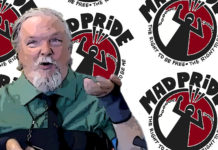Psychiatric Oppression Under Victoria’s Mental Health Laws
Public mental health authorities continue to oppress persons with psychosocial conditions through a combination of punitive and discriminatory laws that are constructed with a "best interests" paradigm in mind and a medical model that pathologises difference and dissent.
What is Open Dialogue Today?
Please join us on Friday, October 23 for OpenExcellence, HOPENDialogue, and Mad in America’s ongoing Town Hall conversation about what Open Dialogue is — and is becoming.
How Academic Psychiatry Minimized SSRI Withdrawal
If academic psychiatry is evidence-based, why did it take two decades to recognize SSRI withdrawal as widespread and chronic among patients?
The Smoldering Wick: Suicide and Faith
Some suicidal people may only benefit from the extraordinary selflessness and profound empathy demonstrated by St. Paul to his jailer. Credentials don’t measure for that.
Insane Medicine: How the Mental Health Industry Creates Damaging Treatment Traps and How You...
Yes, we need to drastically reform the foundational assumptions that govern the ideologies that pervade our systems, but many now know the truth about what is happening, and transformational approaches have been sprouting up organically in the rich soils of human creativity.
Four Children
I went to the children’s ward, to work with the kids. I remembered to tell all of them that I had been locked up my whole childhood on psych wards, and this always made them trust me.
We Are the 100%: World Mad Pride, Disability, & Revolution
This year, I finally got that first major speaking invitation: One of the four keynoters in the largest gathering each year for mental health consumers and psychiatric survivors, Peerpocalypse.
How Many Times Must the “PTSD” Label’s Harm Be Exposed?
A recent Wall Street Journal (WSJ) article and a recent American Psychiatric Association (APA) press release reveal the power the APA has wielded through its various DSM editions in pathologizing the effects of trauma.
How Little We Really Know About Psychiatric Drugs
Joanna Moncrieff reflects on what has and has not changed in the field of psychiatric drug treatment in the years between the first and newly published second edition of the Straight Talking Introduction to Psychiatric Drugs.
The First Studies of Antidepressant Withdrawal
The history of antidepressant withdrawal dates to the first articles on imipramine in the late 1950s. It is useful to compare discussion of both generations of psychiatric drugs and focus on shared efforts to deny and minimize their withdrawal syndromes.
How Psilocybin-Assisted Therapy Changed My Life
I don’t drink or smoke. I’ve never taken any drugs till four years ago. Yet today, my life revolves around psychedelic medicines—heavily stigmatized substances still illegal in this country and most others across the world. How did this happen?
You’ve Got to Be Crazy to Go to a Psychiatrist
To those who say that major scientific/medical advances since 1975 have made going to a biological psychiatrist a rational choice, I say: What advances?
45 years have passed: Is any psychiatric “diagnosis” now verified by lab test, x-ray, or physical exam finding?
Addiction Treatment: How Many Meds Does It Take to Get Sober?
I started to wonder, “How many medications does it take to get sober?” In fact, the biggest correlation I’ve noticed with relapse and overdose is the amount of psychiatric medications being prescribed.
How Mindful Awareness Can Reduce Suffering
Suffering can be altered when people learn how to respond differently to their pain. This is the principle behind mindfulness-based stress reduction, which was designed to incorporate Buddhist practices into chronic pain treatment.
Suicidal Thoughts, Psychiatric Diagnosis, and What Really Helps: Part Two
This piece is the second of a two-part essay about suicide, diagnosis, what doesn't help, and what does help. This part is about barriers to seeking help and about the ways we actually can be of help to people who are considering suicide.
Suicidal Thoughts, Psychiatric Diagnosis, and What Really Helps: Part One
This piece is the first of a two-part essay about suicide, diagnosis, what doesn't help, and what does help. This part is about suicide, diagnosis, and some of what fails to help.
A Conversation with Nev Jones
A dialogue between Nev Jones and Sandy Steingard about Mad in America, critics of psychiatry, medication for psychosis, Open Dialogue, and the need for racial and class justice.
VICE, MIA and The Movement Against Psychiatry
The Vice article was presented as an exploration of the “movement against psychiatry,” and yet you can see, once it is deconstructed, how it told a story that surely pleased the promoters of the conventional narrative, and put the “critics” on the defensive at almost every turn.
Why Is the APA Proposing Sweeping Changes to Training Requirements?
The American Psychological Association has proposed sweeping changes to training, focusing on the behavioral health model, which reduces the complexity of the human experience to observable behaviors.
Malcharist: Fact or Fiction? Big Pharma, Psychiatry’s Key Opinion Leaders and their Ghostwriters
Malcharist, by Paul John Scott, is a fictional account of one of psychiatry’s most influential key opinion leaders (KOLs), his ghostwriter, and a journalist on the trail of a big scandal in the world of Big Pharma.
The Mirror Repeats: The Art of Phoebe Sparrow Wagner
It is uncomfortably difficult to look at Phoebe Sparrow Wagner’s art. That much is intentional. She shakes up the viewer’s sense of wellbeing and security so that they can better identify with the plight of the mental patient.
Stop Saying This, Part Four: Does Time Heal All Wounds?
In part four of this series, Megan Wildhood takes on the tropes of "That's not about you," "The outer world is a reflection of your inner world," "I didn't mean to," and "Time heals all wounds."
CAUTION: Spin Ahead! There is No Evidence That Psychostimulants Reduce the Risk for Infection...
Debunking a recent study on ADHD and COVID-19: It suffers from a series of manipulations and spins that are inappropriate in scientific research that aspires to objectivity and that aims to reveal truths.
Hearing Voices: Let the Community Lead
A collective knowledge of lived experience is a straightforward answer for improving millions of lives, but it has become clear that it will take an organized community of voice-hearers and their allies to take back credibility and authorship on the narrative of our own lives.
A Positive Change for Mad in America Continuing Education
We are going to organize webinar events, starting this fall, that will be easier to register for (sign-up on Zoom), free (donations will be accepted), and often feature two or more speakers (or a panel), with more time devoted to an interaction with the audience.

































